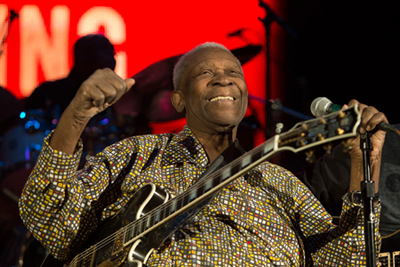
LEHMAN CENTER FOR THE PERFORMING ARTS presents
The King of the Blues B.B. KING
“B.B. is not just great, he’s GREAT! - Bono
“I can tell B.B. from just one note.” - Eric Clapton
“Original and passionate style, juicing the country blues with electric fire and jazz polish.”
- Rolling Stone Magazine
Lehman Center for the Performing Arts is honored to present the legendary King of the Blues, B.B. KING on Saturday, April 19th, 2014 at 8pm. With a unique, instantly recognized voice and guitar sound, B.B. King has been the most renowned blues musician in the world for more than 50 years.
Lehman Center for the Performing Arts is on the campus of Lehman College/CUNY at 250 Bedford Park Boulevard West, Bronx, NY 10468. Tickets for B.B. KING on Saturday, April 19th, 2014 at 8pm are $100, $75, $65, and $55 and can be purchased by calling the Lehman Center box office at 718-960-8833 (Monday through Friday, 10am–5pm, and beginning at 12 noon on the day of the concert), or through online access at www.LehmanCenter.org. Lehman Center is accessible by #4 or D train to Bedford Park Blvd. and is off the Saw Mill River Parkway and the Major Deegan Expressway. Low-cost on-site parking available for $5.
B.B. King has become such a beloved and influential figure in American music, it’s easy to forget how revolutionary his guitar work was. As Buddy Guy explained it, “Before B.B., everyone played the guitar like it was an acoustic.” Borrowing from Lonnie Johnson, Blind Lemon Jefferson, T-Bone Walker and others, he developed one of the most readily identified guitar styles, with precise vocal-like string “bends” and a left-hand vibrato that have become indispensable components of every rock guitarists’ vocabulary. “Hearing T-Bone Walker play “Stormy Monday” was the prettiest sound I had heard in my life,“ King is quoted as saying. “And that’s what really started me to play the blues.” Ranked as number 3 in the Rolling Stones Magazine’s list of the 100 Greatest Guitarists of All Time, he is credited with influencing many of the world’s greatest blues and rock guitarists, including Jimi Hendrix, Eric Clapton, Mike Bloomfield, Keith Richards, Jeff Beck, Albert Collins, and Freddie King on a long list of many more.
Born Riley B. King on September 16, 1925, on a cotton plantation in Itta Bene, Mississippi, he sang in the local gospel choir and played on street corners for dimes. Moving to Memphis, Tennessee in 1947, he stayed with his cousin, Bukka White, one of the most renowned rural blues performers of his time, who schooled King further in the art of the blues. His first big break came in 1948 when he performed on Sonny Boy Williamson’s radio program on KWEM out of West Memphis, which led to steady engagements and later his own spot on black-staffed and managed radio station WDIA. As his popularity grew, his catchy radio name, Beale Street Blues Boy King, got shorter, then Blues Boy King became B.B. King. Soon after his #1 hit “Three O’Clock Blues,” (1951) King began touring vigorously, which he continues to this day, an unstoppable musical force even at the age of 88.
Lucille. In the mid-1950s while King was performing at a dance in Twist, Arkansas, two men got into a fight and knocked over a kerosene stove, setting fire to the hall. Racing outside to escape the inferno, he realized that his $30 acoustic guitar was still inside, which he rushed back in to retrieve, narrowly escaping death. When he found out the fight had been over a woman named Lucille, he gave that name to his guitar -- and each of his trademark Gibson guitars since have been called Lucille.
Many of B.B. King’s albums are considered blues classics, such as 1965’s definitive live blues album Live at the Regal, and his 1976 collaboration with Bobby “Blue” Bland, Together for the First Time. Over the years, he had a second #1 R&B hit -- “You Don’t Know Me” (1952) -- and four #2 R&B hits – “Please Love Me” (1953), “You Upset Me Baby” (1954), “Sweet Sixteen, Part I” (1960), and “Don’t Answer the Door, Part I” (1966). In 1969, the Rolling Stones helped to introduce him to a young, white audience by having King open 18 American concerts for them. His most popular crossover hit, 1970’s “The Thrill is Gone,” went to #15 on the pop charts and won two Grammy® Awards including the Hall of Fame Award. In 2012, a feature documentary titled B.B. King ¯ The Life of Riley narrated by Morgan Freeman was released. With over 50 albums, 17 Grammy® Awards including the Lifetime Achievement Award, numerous Downbeat, Guitar Player, W.C. Handy and NAACP Image Awards, multiple honorariums including the Presidential Medal of Freedom, the Presidential Medal of the Arts, the Kennedy Center Honor and induction into the Rock and Roll Hall of Fame, seven honorary degrees including Berklee College of Music and Yale and Brown Universities, and his many television and film appearances, B.B. King has well earned his reputation as the “King of the Blues.”
Lehman Center is supported, in part, with public funds from the New York City Department of Cultural Affairs in partnership with the New York City Council. The 2013-2014 season is made possible by the New York State Council on the Arts with the support of Governor Andrew Cuomo and the New York State Legislature, JPMorgan Chase, and through corporations, foundations and private donations.